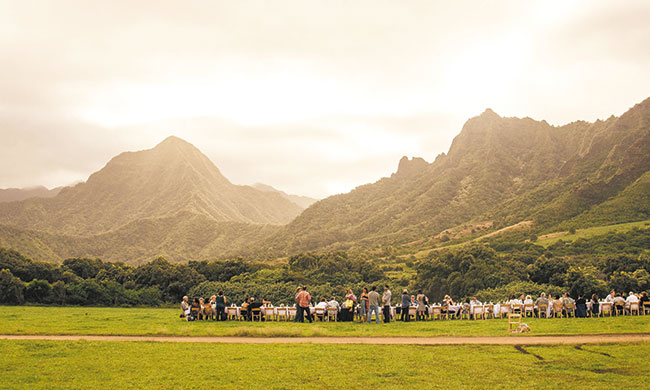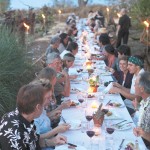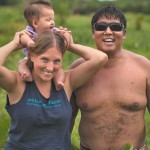STANDING OUT

Last year’s Outstanding in the Field dinner at Kualoa Ranch (inset) OITF founder Jim Denevan at a dinner in Wisconsin Photos by Ilana Freddye, OITF
In the hour leading up to the December Honolulu Night Market, chef Mark Noguchi weaves in and out of Kakaako Agora, grabbing food trays from his van. Kakaako Agora is hosting a pop-up shop for clothing company Kealopiko that night — and Noguchi is there to provide dinner for the volunteers through his catering company, The Pili Group.
Pili is just one of several ventures that Noguchi has been a part of in the last several years — he also was one of the founding partners of Heeia Kea Pier General Store & Deli, and prior to that, he cooked at Chef Ma-vro and Town. The Pili Group, which Noguchi thought up alongside wife Amanda Corby, also was the force behind restaurant incubator Taste Table, as well as Hawaiian Airlines’ employee cafe Lunchbox and its affiliated Kakaako spot, Snackbox. It’s also set to launch a new eatery, Mission, inside of the Hawaiian Mission Houses, in January. On top of all that, Pili also caters events like this.
It’s an eclectic mix, but the common thread throughout Pi-li’s work — and Noguchi’s — is a dedication to fostering healthy, sustainable food systems in a way that promotes dialogue.
“We have finite resources,” Noguchi says, settling into the back of his van to take a break. “To make people think a little bit more about what we eat and how we eat, I think, is very important for us living on an island. We can make a small difference — we meaning the collective — and start to affect the way that people look at our food system.”
It’s that concept that No-guchi will further in his role as guest chef at an outdoor dinner produced by Outstanding in the Field (OITF) at 3 p.m. Jan. 25 at Kualoa Ranch. The California-based OITF partners with chefs and farmers throughout the world to host communal dinners, with the goal of connecting consumers to the people and locations that produce their food. With many OITF events taking place right at the site where the food is grown, it’s less farm-to-table than it is farm-as-table.
Reprising his role as guest chef for the second year in a row, Noguchi partners with farmers John and David Morgan to prepare a meal featuring locally sourced items.
When chef and OITF founder Jim Denevan came up with the concept for OITF in 1999, the terms farm-to-table or sustainability were still years away from the ubiquity they have today. Denevan’s oldest brother is an organic farmer, and Dene-van spent much of his teenage years helping him out.
“I always thought that his work was so fascinating,” Denevan recalls. “But it seemed that the chefs were getting all of this attention and the farmers weren’t.”
Later, as the founding chef of Santa Cruz eatery Gabri-ella Cafe, Denevan sourced many of his ingredients from area farmers — and listed them on the menu.
With OITF, Denevan aims to spread that type of awareness to a larger audience. Each summer and fall, Dene-van and his crew hit the road in their bus, driving from city to city. Hawaii has become a sort of yearly winter retreat, and outside of hitting all 50 states, OITF also has hosted dinners in nine countries.
Ingredients for all meals are sourced within that particular area.
“It is just a great connection with food and the people behind our food,” Denevan says.
In the years that OITF has been putting on these dinners, Denevan has seen a sea change in the emphasis on local food — even during his travels throughout the world, both through OITF and through his work as an artist. (On a recent trip to Dubai for an art project, for example, he was eating a date muffin at his hotel restaurant; a sign at the table explained that the fruits were sourced from a nearby farm.)
“People supporting local food has become a worldwide thing,” Denevan says. “I think people want a connection to where they live and the people where they live.”
Fostering those types of connections, Pili Group sources ingredients from places that include Frankie’s Nursery, Paepae o Heeia, Shinsato Farm, MA’O Organic Farms, Poamoho Organic Produce, Ho Farms, and Naked Cow Dairy. Noguchi calls them all co-producers.
For the OITF dinner, Nogu-chi has a hyper-local spread planned: “We are sourcing as many ingredients from that area, Koolaupoko, as we can.”
That means he can’t speak on the specifics of the meal, yet, but he plans to incorporate fish and oysters, depending on the catch as the event draws closer. He also will utilize indigenous roots like kalo and ulu. Running with the dining outdoors aspect of OITF, he’s modeling the meal to be an elevated version of what people may prepare if they’re camping or eating at the beach. Lee-Anne Wong of Koko Head Cafe (and of Top Chef fame) and Dave Newman of Pint + Jigger are among partner chefs that will be joining him.
It might at first sound like a non-sequitur, but when asked about how he got interested in food, and more specifically, how he got into the local food movement, Noguchi invariably traces it back to his days dancing hula in his early 20s with a Hilo-based halau. With the halau, Noguchi travelled extensively, enjoying varied foods along the way.
By the time he was 25, Noguchi wasn’t sure if dancing hula and playing music were what he wanted to do for the rest of his life. A friend off-handedly suggested that he give cooking a whirl.
Right away, he found the two disciplines were similar in one crucial way: “In hula, when you pick ingredients to make lei, you start being hyper-aware of your surroundings. And you also have to have respect for what you are picking … The same with cooking. You need to treat ingredients with respect.”
In that sense, Noguchi feels that supply should dictate demand, not the other way around.
“As chefs, we can be real selfish,” he says. “You call your purveyors and say, ‘I need this, this and this, and I need two pounds of that, and 10 pounds of that.’ But we should be asking our co-producers, ‘I am looking for 10 pounds of vegetables, whatever you have’ … That is the way we need to cook and how we cook responsibly.”
In addition to creating thoughtful dialogues about the nature of food, Denevan feels that part of the appeal of an OITF dinner also is found in the structure of the long table — where everyone, friends and strangers, eats together.
“There are the philosophic aspects of everything that we do — and then there also are just the straightforward, good old values of good food and good company.”
For more information and to purchase tickets for Outstanding in the Field at Kualoa Ranch, visit outstandinginthe-field.com.




